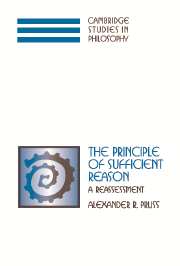Book contents
- Frontmatter
- Contents
- Acknowledgments
- Part I The Principle of Sufficient Reason and the Causal Principle
- Part II Objections to the PSR
- 4 A Modern Version of the Hume Objection
- 5 The Anti-theological Argument That There Are No Necessary Beings
- 6 Modal Fatalism
- 7 Free Will
- 8 Quantum Mechanics
- 9 Turning Leibniz against the PSR
- 10 What Survives the Criticisms of the PSR?
- Part III Justifications of the PSR
- Bibliography
- Index
4 - A Modern Version of the Hume Objection
Published online by Cambridge University Press: 27 July 2009
- Frontmatter
- Contents
- Acknowledgments
- Part I The Principle of Sufficient Reason and the Causal Principle
- Part II Objections to the PSR
- 4 A Modern Version of the Hume Objection
- 5 The Anti-theological Argument That There Are No Necessary Beings
- 6 Modal Fatalism
- 7 Free Will
- 8 Quantum Mechanics
- 9 Turning Leibniz against the PSR
- 10 What Survives the Criticisms of the PSR?
- Part III Justifications of the PSR
- Bibliography
- Index
Summary
TOY MODELS
An impressive variant of the Humean argument, inspired by ideas of J. Brian Pitts, is as follows. The cosmological literature is full of “toy models,” complete coherent physical models of universes. Those toy models that model a universe with a finite past, such as the Robertson-Walker hot Big Bang model, are models of universes that come to exist for no cause, since models in physics generally do not include any universe-creating deity. Insofar as the models are coherent, we see that it is possible for something, namely, the universe, to come to exist out of nothing, pace all the forms of the PSR that entail that the ex nihilo nihil principle is a necessary truth. Moreover, in fact, physicists think that the models are compatible with at least a subset of the laws of nature. But if so, then surely they are self-consistent and metaphysically possible.
It will not do to challenge this argument on the basis of the claim that the physical laws the physicists invoke are false, for even if they are false, one might think that similar models could be constructed using the true ones, unless we are completely wrong about what the true laws look like. Moreover, even if the laws are false, they surely describe logically possible situations, and that is all that is needed.
One way to gloss the argument is just to say that any internally coherent mathematical theory describes a possible reality. But this is not sufficient for the conclusion.
- Type
- Chapter
- Information
- The Principle of Sufficient ReasonA Reassessment, pp. 75 - 81Publisher: Cambridge University PressPrint publication year: 2006



